By Gregory Paul Silber
Writer Scott Snyder and artist Greg Capullo are among the most celebrated frequent collaborators in comics today. While they have no qualms about admitting their relationship had a rocky start, their work together on Batman, and subsequently Dark Nights: Metal and their current project, Batman: Last Knight on Earth, exemplifies how effective comics can be when they’re lead by collaborators who consistently enjoy challenging — and complementing — each other.
Capullo and Snyder are clearly good friends, as well as effective collaborators, so it’s only a matter of time before their next project together is confirmed. Their time on Batman, however, appears to be drawing to a close, as Last Knight on Earth has been billed as the final chapter of their Batman saga… for now, at least. It follows a confused Dark Knight traversing through a post-apocalyptic wasteland with the disembodied, and inexplicably (yet hilariously) sentient head of the Joker as his companion.
As usual from the Snyder/Capullo team, It’s fun, thoughtful stuff, so I couldn’t wait to talk to them about their comics, and what they’ve learned from each other over the course of their relationship.
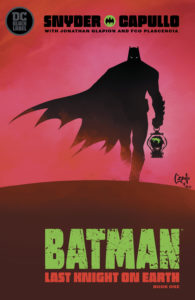
Gregory Paul Silber: You guys have been telling Batman stories together for nearly a decade now, starting in 2011 with the New 52. How, if at all, does the mature readers format of Black Label change your creative process?
Scott Snyder: For me, it’s the same story we would have done in the main continuity. But I think emotionally, it’s a darker story than I was prepared to do in the main book. Honestly, it’s very personal and urgent. It’s meant to be Batman realizing that at this particular moment in time, people choose villains over heroes. They don’t want their heroes to represent them or help them anymore. And that’s the kind of story that would be hard to pull off in the continuity… there’s a few curses and there’s some violence and stuff but—
Greg Capullo: There’s a Bat-Penis, but it’s in shadow.
Snyder: (Laughs) For me it’s the it’s the emotional complexity and darkness of the story that warrants the Black Label.
Silber: Greg, it’s physically a larger comic than we’re usually dealing with from your regular monthly books too, so does that change the way you approach it at all?
Capullo: Well I mean, they gave me the time, you know? So… we wouldn’t be having this interview if I had to do it on a monthly basis! (Laughs) What do you think this is? I’d be a dead man. But they’ve given me the time. So it’s actually this blessing and a curse because having the extra time, I have time now to obsess even more. What I want to put into a panel. The emotion I want to infuse into the characters. Yeah, I’m eating up that clock. But I like this better and I want to continue to work in this way with Scott, to where it’s not the monthly pounding out deadlines. You know, it could appear that it’s monthly because we can do a bunch of it and then start trickling it out month after month, but I think our work will be elevated. I know mine will, if we keep working the way we’re working on Last Knight.
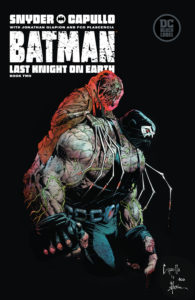
Silber: Totally. And Scott, you said that that it’s your last Batman story, at least for the foreseeable future. So I want to ask you guys what you think makes a good ending. Specifically, what do you think makes a good ending to a run of a character like Batman, who is meant to continue indefinitely?
Capullo: Well Scott really wrote that to the last issue, didn’t you buddy? I don’t want to give away anything
Snyder: I can’t spoil it! Because really the whole series is about that, but the ending-ending is exactly what you’re… I mean, the story is about — like I said earlier — it’s a kind of world that doesn’t want Batman or the heroes anymore. And it’s about what he chooses to do to endure that. And then ultimately, why he’s important even in that world, and why he’ll always be reborn in some way. So it’s very much about exactly what you’re saying. So it’s built, baked into the DNA of the ending.
Silber: Well, there have been traces in your run of these kind of metafiction elements. So I understand you can’t give too much away, but I’m excited to have it end on that sort of note.
Snyder: Yes, it is definitely metafictional in the regard that it’s very much a thesis on why Batman is important and always will be important. Always be reborn, at some point. And also needs to be reborn in new ways at different moments. It’s about why Batman can’t remain static.
Silber: Which is funny, because you’ve literally had him do that, be reborn. It’s a running motif in the stories. So I’m also wondering, with this being a capstone of your ongoing collaboration, what has changed about your relationship as collaborators since you first started together back in 2011?
Snyder: Wow…
Capullo: Well, I started at Marvel so I was taught how to work from plot. So you’d get like four to six pages of evocative writing, and you paced it out to be 22 pages. And you did it! Then I worked with Todd MacFarlane, and that was probably closer to how Stan Lee worked with Jack Kirby. Todd would call me up, and I would jot down notes, reporting. And then I jumped in with Scott and he was giving full scripts to the point of telling me how many panels on a page, what was in the panels, and things like that. So… we don’t work that way anymore. [Snyder laughs.]
No, I just couldn’t. You don’t need me if that’s how you work because, you know, I have this different skill set. Marvel trained me to be this way. So if you want to do all that, you just need a draftsperson who could put that together for you. So Scott has realized that. He still sort of does this full script thing. But he doesn’t give it to me that way. He’ll do it so he can understand his own path, and then he takes the chunks out so that I don’t have any restrictions.
And so, he is giving me more freedom to breathe and create. So that’s the biggest change. And we’ve grown to trust each other, which I predicted very early. When things weren’t going well and it looked like it was going to be a thing that was going to be volatile and self-destruct, I told my wife, who was upset that he was beating his chest like King Kong— [Snyder laughs.]
I said, “Listen, he doesn’t know me. He doesn’t know what I could do with his work. Once he sees what I can do with it, he’ll start to trust me, and he’ll back off. And that’s exactly what was taking place.
Snyder: 100 percent.
Capullo: We have mutual respect for each other. We know that our goals are always the same, which is “how do we make this the best possible project that we can?” We both care about the characters. We’re both passionate. We trust each other. We respect each other. And that grew after all these years. We’re a great team. Both because of that, and because we have a very close friendship. And those things come together.
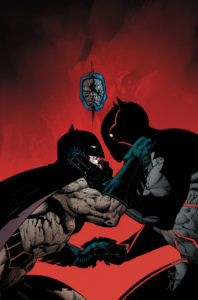
Silber: What advice could you give other creators about how to collaborate effectively with each other?
Snyder: I’d echo what he said. I mean, the entire arc of my career I think has been built around, for me at least… moments working with Greg. For the better. Like I mean. I feel like I’ve grown and evolved as a writer because of this relationship. I’m deeply grateful for that. He’s 100 percent right. When I came in, I was like, “Full script always! It has to be this way!”
When I saw what he was capable of doing, like issue #5, where we first sort of got noticed, where the book turned… that was his idea! Because I gave him room to come up with something that would represent Batman’s disorientation. It stunned me, and made me realize I’m holding this guy back. He’ll elevate my own work as well. There have been so many moments like that along the way that my biggest piece of advice would be, talk to your collaborator and say, “How do you like to work? Do you like to work full script? Do you like to work Marvel style? Do you like to talk on the phone?”
Capullo: Yeah, you have to be compatible. Because like I said, I was raised by Marvel, who taught me how to work from plot. But not everybody has this skill set. I’ve talked to other artists. And when I talk about working the way I work, they go, “Oh my God! Well I could never do it. I need a writer who tells me what to put in every panel.” So that’s why I say, get to know who you’re working with, and that you have a compatibility. Scott is flexible, but some people may not be able to be flexible and modify what they’re doing. So it’s very important right up front to figure out who you’re saddled with because you’re forming a collaboration. You have to interview each other.
Silber: My last question is a two parter. Batman: Last Knight on Earth is such a great ending to your Batman run, and you’ve done so many great stories together. So Scott, I want you to say what you like most about Greg’s art, and Greg, I’d like you to say what you like most about Scott’s writing.
Snyder: To me, he is the best artist there is in comics and the reason is that he lives and dies by the emotion of the story, always. Every panel, it dictates everything he decides to do. So I trust him, fully, because anything he’s choosing to do, even if I don’t see it at first, I know is done out of passion for communicating the emotional truth of the story in that sequence as best as possible, as effectively as possible. So for me, all the acting, all the action, all that stuff… all of it comes down to knowing that his compass is the truest of anybody I know in comics.
So that, to me, is always what makes him the best. Because he cares so much. The second thing I’d say is that we’re very similar in that we both obsess over the story to make it as good as we can. So the fact that he’s already a rock star and could basically phone it in and it would still be great, but instead really slaves over every page, every panel, in service of the truth of that sequence… it means the world to see. So it inspires me to be better all the time.
Capullo: To me, Scott’s writing is so — I always say the same thing — it’s very layered. So well thought out. So it’s just not a superficial thing. If you start to peel back, I mean he’s got so much packed in to everything that he writes. So it forces me — and I’m not complaining — but it forces me to really get deep contemplation and deep dives into these characters. Because he has so much going on beneath the surface. And that’s what I really appreciate [in] writing.
I mean, I’ve been drawing comics for almost 30 years, I guess. And it’s all fun. I’ve never worked with a writer is this layered and this deep. And this well thought out and this well planned. He’s another level when it comes to that sort of thing. It’s a joy to work with that because it pushes my boundaries. Like I said, I really like doing the acting. I got into comics for the big action, like most every artist, right? Throw in another character going through a skyscraper, that’s great. But you know I really enjoy the acting and the emotion. Characters. I like the body language and all the subtleties that make us human. I love that. It’s all there, interwoven in all of his scripts. It gives me what I need.
Batman: Last Knight on Earth #3 hits shelves Dec. 18, 2019. FOC is Nov. 18, 2019 with Diamond Code SEP190478.


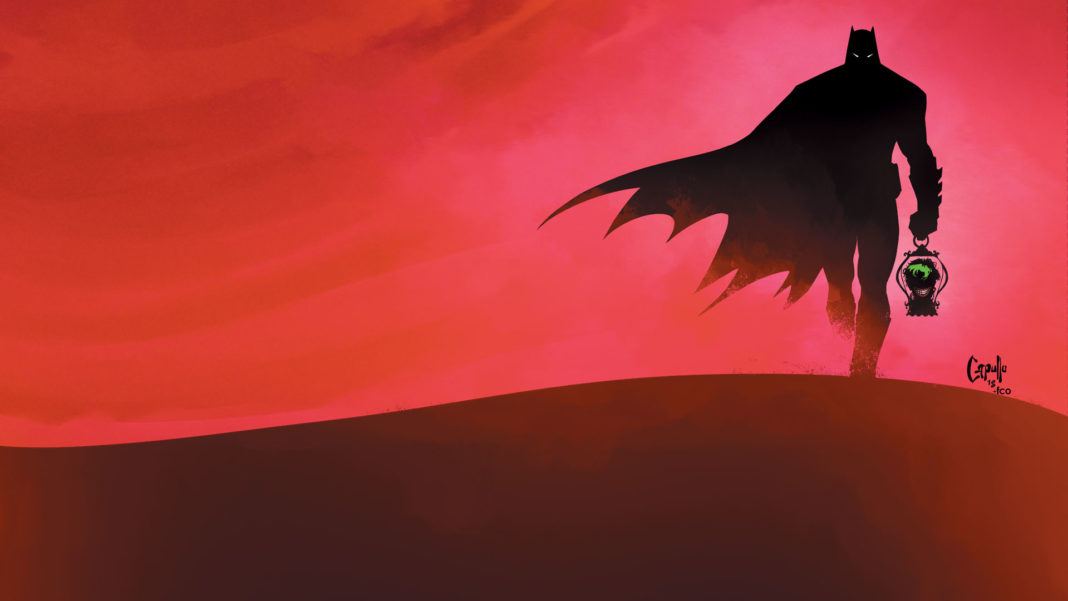
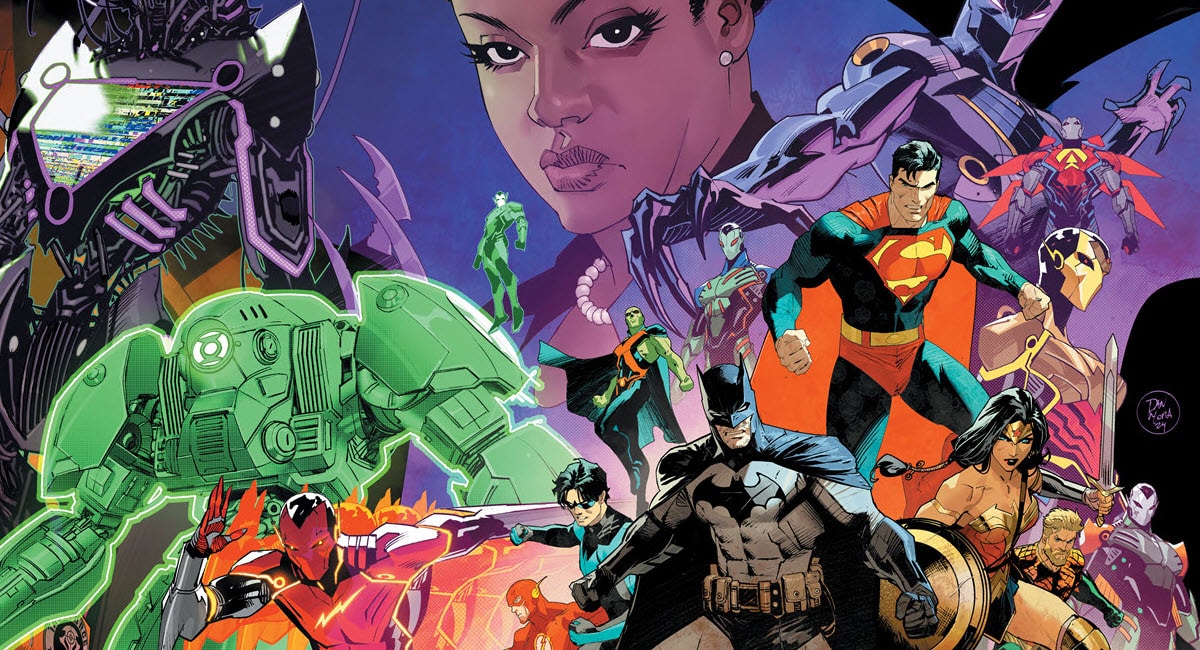
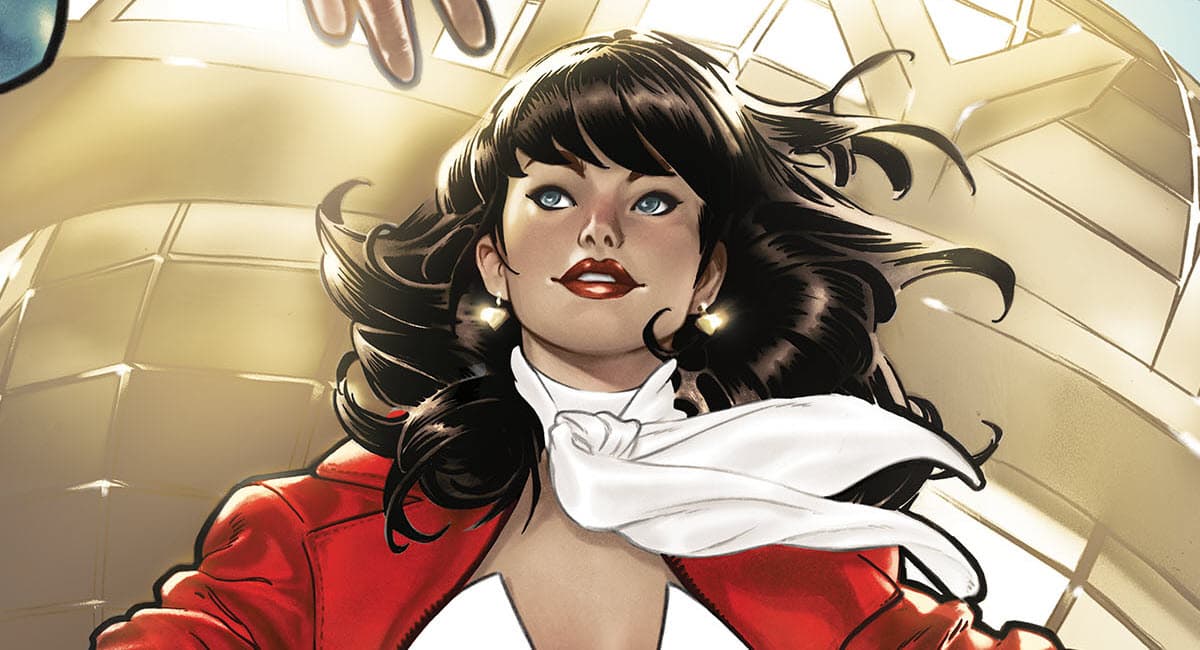
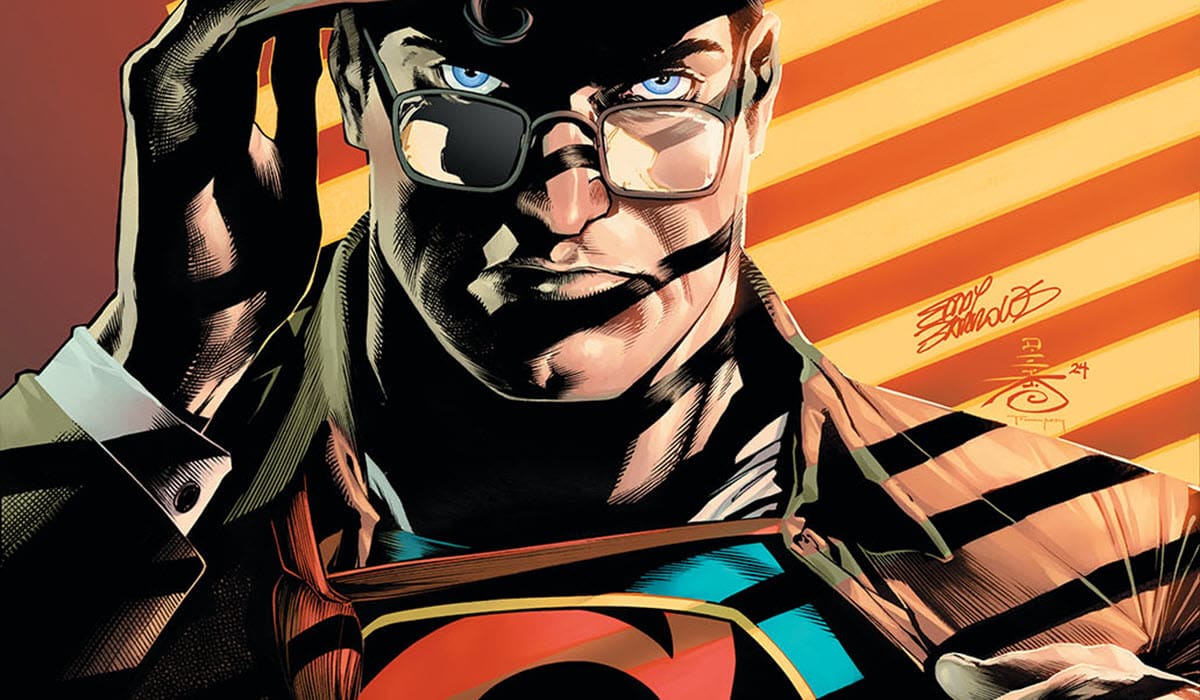



Comments are closed.